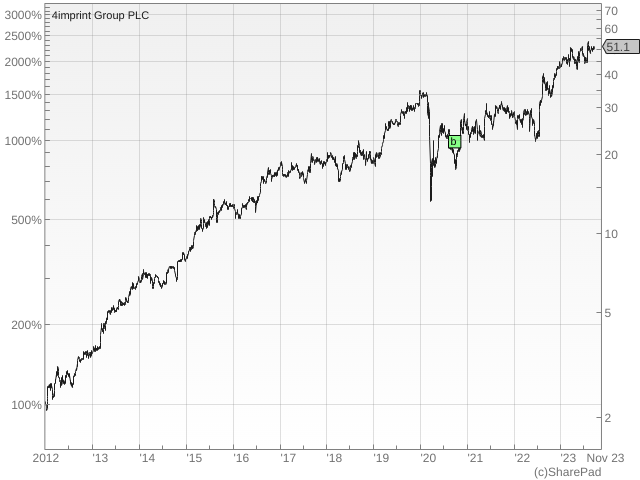Since Richard started scoring companies in SharePad last April, twelve companies have scored zero strikes, the best possible score. In this article, he decides which of them to research next.

Five-strikes-wise, there is not much to report on. I have awarded four shares that have reported in the last two weeks with less than three strikes, which means they could be candidates for investment.
Two are Asset Managers (City of London Investment Group and Ashmore) and two are housebuilders (Barratt Developments and Redrow).
I am unlikely to pursue any of them.
SharePad has been alive with commentary from Phil and Bruce on housebuilders in recent weeks, and to my mind, their analysis validates my disinterest because these companies do not profit through thick and thin.
Judging by their profitability, housebuilders have the look of relatively stable businesses until you go back to the Great Financial Crisis, which was fifteen years ago, but it seems unlikely that the economics of the industry have changed.
Housebuilders’ profits are sensitive to house prices, and the house price crash never seems that far away (though often it is!). Asset managers are similar except their profitability is sensitive to share and bond prices.
Buying and holding shares for ten years or more means not acting on price movements and economic news, aka trading, which is only feasible if companies are to a large extent in control of their own destinies.
Since housebuilders and asset managers cannot control the fragile confidence of their customers, house buyers and investors, and these external factors determine their profitability to a large extent, these businesses are uninvestable to me.
All the zeros
Below is a table of shares that have received no strikes at all. They have near-perfect financial track records as judged by my “one custom table to rule them all”. Additionally, directors own substantial amounts of shares, and they have been listed for eight years or more.
Companies that have good track records do not necessarily go on to be good investments, but I focus on shares that score 0, 1 or 2, because shares that score 3 or more strikes give me too much to think about, and I do not like my investments to be too complicated.
|
Company |
TIDM |
Latest annual report |
Status |
|---|---|---|---|
|
4imprint |
FOUR |
18/4/23 |
Invested |
|
Auto Trader |
AUTO |
30/6/23 |
Invested |
|
Christie |
CTG |
19/5/23 |
Cautious |
|
Computacenter |
CCC |
17/4/23 |
Intrigued |
|
FDM Group Holdings |
FDM |
5/4/23 |
Intrigued |
|
Fevertree Drinks |
FEVR |
21/4/23 |
Intrigued |
|
Kainos Group Ltd |
KNOS |
21/7/23 |
Intrigued |
|
M Winkworth |
WINK |
28/4/23 |
Cautious |
|
Mortgage Advice Bureau |
MAB1 |
20/4/23 |
Cautious |
|
Nichols |
NICL |
29/3/23 |
Cautious |
|
Record |
REC |
30/6/23 |
Cautious |
|
Telecom plus |
TEP |
7/7/23 |
Cautious |
The 5-strikes system is a way of prioritising which shares to research. Today we will prioritise the list of companies that have scored 0 strikes. The result of that process is summarised in the Status column in the table.
This article tells of how I found 4Imprint, a direct seller of promotional goods (freebies like tee shirts and coffee cups branded with corporate logos) in 2013 and then re-discovered it in 2018, having missed out on five years of returns. The story has developed well, though.

‘B’ indicates a ‘buy’ (at £19.26) in the Share Sleuth portfolio, a model portfolio the author runs for Interactive Investor, using SharePad to administer the holdings and measure their performance.
I finally added the shares to the model Share Sleuth Portfolio and bought them in my own Self Invested Personal Pension when the price had been whacked during the pandemic. Since each holding is reviewed once a year, my research is done. I also own and review Auto Trader annually. Auto Trader is the dominant UK used car marketplace.
Christie, which provides stocktaking, finance and insurance brokerage services to businesses, is one of six companies that I will not be investing in soon, despite their unblemished financial records. It has the potential for instability in its two divisions.
Others in this category include estate agency franchise M Winkworth and Mortgage Advice Bureau, which also operates a franchise network. These companies are exposed to the same boom and bust property market as housebuilders.
Their exposure is probably lower. Brokers and estate agents do not own rapidly depreciating assets (houses) when house prices fall and although the fees they earn may fall with the volume and size of transactions, the pain will be shared with the franchisees. Winkworth also lets houses.
However, Winkworth and Mortgage Advice Bureau and other property services companies like them have listed since the financial crisis, and I would like to see how they perform through a testing time for the property market.
Nichols, the owner of Vimto and various other soft-drink brands is a financial stalwart, but despite the introduction of sugar-free versions of its products, I doubt beverages that many of us drink more routinely than water can ever be described as “healthy”.
To own shares for the long-term, I need to approve of what the business does as well as believe it will generate decent returns, which makes it difficult for me to consider Nichols.
The same is true of Telecom Plus.
Telecom Plus is at the same time intriguing and off-putting. If you listen to John Kingham describing how the company pioneered a new way to reach utility customers disinterested in the price comparison game, you will be intrigued (fast forward to about halfway through the podcast).
The company has a distinctive business model that generates decent returns, but Telecom Plus is distinctive because it sells mobile, broadband and energy contracts directly through multi-level marketing. This involves self-employed agents selling to friends and family and door-stopping strangers. Most of the spoils go to the early recruits, and the army at the bottom of the pyramid earn a few hundred quid a year.
It feels inequitable and unsustainable, and I am having trouble reconciling that feeling with the fact that Telecom Plus has sustained its business model for decades.
Record principally hedges (eliminates) currency risk for pension funds but Maynard’s recent article made me wonder if I could ever understand how it makes money sufficiently to have the confidence to invest, especially now its strategy is evolving.
Research list
By elimination, we are left with four intriguing businesses that could turn into investments.
I took a closer look at FDM last May. The company has earned impressive profits by recruiting, training and deploying IT people with its customers, traditionally banks and financial institutions. The big risk in my mind is artificial intelligence, which promises to do the kind of low-level programming many of FDM’s employees do.
FDM’s mantra is that technology changes, but the kind of people its customers want to implement it (talented, enthusiastic and so on) do not, and judging by its blog posts, which boost artificial intelligence roles and applications of artificial intelligence, it seems FDM intends to turn the risk into an opportunity.
Software developer Kainos also joined my research list recently because of its very strong financial track record, and two distinctive divisions.
It has been much longer since I investigated Computacenter, a large IT reseller, but judging by the numbers, dusting off and updating those notes is long overdue.
Fevertree makes mixers, the non-alcoholic drinks we mix with alcohol. Given how I feel about soft drinks, you might think my interest in Fevertree is fantastically hypocritical. But for most of us, a gin and tonic is an occasional, albeit unhealthy treat.
I probably could bring myself to invest in Fevertree, but the question I would need to answer is what, if anything, makes its business special.
Of course, I do not expect you to share the same values as me, but if I am rejecting Nichols or Telecom Plus, and opening the door to Fevertree because of my own personal prejudices, you need to know.
~
Contact Richard Beddard by email: richard@beddard.net or on Twitter: @RichardBeddard
Got some thoughts on this week’s article from Richard? Share these in the SharePad chat. Login to SharePad – click on the chat icon in the top right – select or search for a specific share

This article is for educational purposes only. It is not a recommendation to buy or sell shares or other investments. Do your own research before buying or selling any investment or seek professional financial advice.



